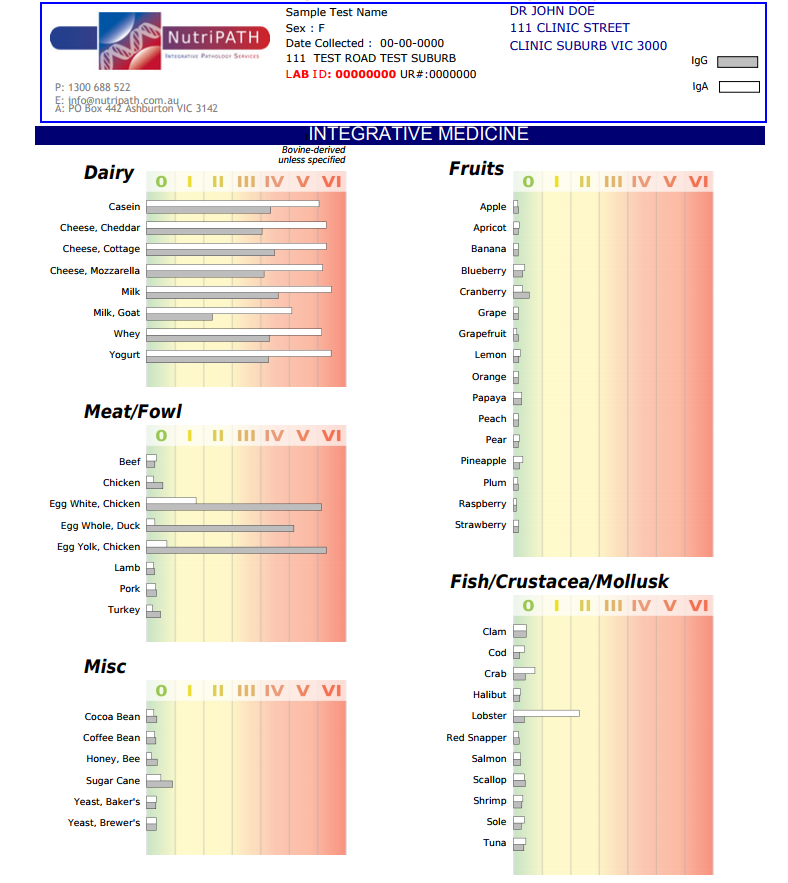So what exactly is food intolerance?
The complex way food affects our everyday lives is an emerging area of understanding, and diagnosing the cause of symptoms which seem to be ‘unexplained’ is often difficult.
Although not life-threatening, food intolerance should never be underestimated as its impact on sufferers can be significant, sometimes affecting their ability to live normal healthy lives. The incidence of food intolerance is extremely wide and it is estimated that 45% of the population could be affected. Many people with food intolerance experience more than one symptom. Symptoms can often be vague and the root cause of the problem, food, is not always correctly diagnosed. Sufferers often complain of seeming to be in a ‘fog’, feeling bloated and being tired all the time.
Essentially food intolerance is your body’s abnormal reaction to certain foods which can manifest itself in a number of ways.
Some people will have one symptom such as a severe headache whilst others will be unfortunate to experience
irritable bowel syndrome, migraine and skin or respiratory conditions. Realising that your food is a catalyst for particular symptoms is not easy when, unlike the immediate reactive symptoms of food allergy, food intolerance symptoms often appear hours or even days later. In fact, many food intolerance sufferers have commented post-diagnosis and after having removed the problem foods that they realise they had been experiencing minor symptoms as a result of intolerance for their entire lives.
Food allergy is not the same as food intolerance.
A common confusion generally exists whenever the words food allergy or food intolerance enter a sentence.
A classical food allergy (such as peanut or shellfish allergy) is usually characterised by an immediate and often severe reaction of the immune system to exposure to a specific food.
The symptoms of food allergy include sneezing, rashes, skin irritation, swelling, runny nose, fatigue, diarrhoea and vomiting. Normally symptoms occur within a few minutes of eating or coming in to contact with the offending food, although they can be delayed by up to two hours.
Food allergy is quite rare with only about 2.5% of the population being diagnosed with the condition. The most common instances of food allergy are to peanuts, tree nuts (almonds and brazils), eggs, milk, fish and shellfish.
When exposed to the source of food allergy the body makes specific antibodies (IgE) to ‘fight off’ the allergens found in these foods and when the food is next eaten it triggers an immune system response which results in the release of histamine and other naturally occurring chemicals in the body. Allergic reactions to food can vary considerably in their severity and some can be fatal.
Food intolerance and food allergy in brief
| Food Intolerance | Food Allergy | |
| · Reactions are usually delayed and symptoms may take several days to appear.
· You can be intolerant to several different food groups at the same time. · Sufferers can experience multiple symptoms, from migraine to bloating, diarrhoea, lethargy and a general feeling of unwellness. |
· Reactions usually occur quickly, with a maximum of 2 hours after exposure to the ‘reactive’ food.
· Food allergy involves the body’s immune system and is a reaction to a specific food. · Symptoms include: difficulty breathing, rashes, swelling, runny nose and anaphylactic shock. These can potentially be life threatening. |
Symptoms
If you or any one you may know are having any of the following symptoms they could be suffering from food intolerance.
Food intolerance sufferers can also experience more than one symptom at the same time and may only present a couple of days after consuming certain foods.
| Anxiety (acute or chronic) Arthritis Asthma Bed wetting Bloating Bronchitis Coeliac Disease Chronic Fatigue Syndrome Constipation Diarrhoea Fibromyalgia |
Gastritis Headaches Inflammatory Bowel Disease Insomnia Irritable Bowel Syndrome Itchy skin problems Malabsorption Migraine Sleep disturbances Water retention Weight control problems |

